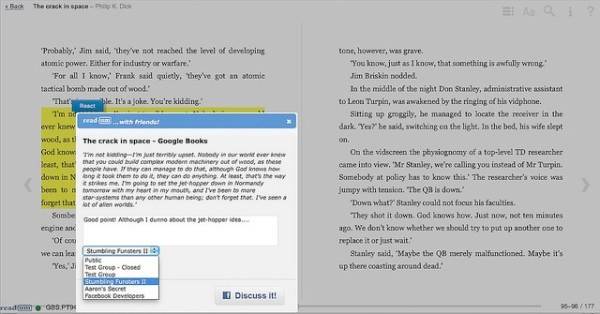A rather grim story in The New York Times last month posited that our move to digital literature would spell the end of marginalia, the notes and comments that we scribble in the margins of printed books. How would we know what snarky comments Mark Twain left in the margins of his library had he only read books on his Kindle?

I’m not sure that the future of marginalia is quite so dim. Nor do the folks at ReadSocial, who are working on an API that would, as the name suggests, help open up our digital annotations to others and help make e-reading social.
ReadSocial’s API aims to provide a social layer that works on top of and across reading systems. In other words, it means that passages from books, magazines, newspapers, blogs, and so on can be excerpted, annotated, and pushed to our social networks. The API would serve to free content and discussions from being siloed in a single platform
Say, for instance, I am reading an e-book on my Kindle, but I want to share my annotations with someone who’s reading that same book on a Nook? How can we compare notes? (Well, we can’t – and that’s the problem that ReadSocial is addressing.)
Making Notes in the Margins of the Google Books Library
ReadSocial has developed a proof-of-concept project that uses Google Books and Facebook to demonstrate how this can work. It’s called Readum, a Firefox and Chrome extension that lets you highlight any passage from a Google Book, attach a note, and then share it to Facebook – to your wall or to a Facebook group.

Close Reading 2.0
My background in literature, I’ll admit, makes me pretty excited about the prospects of this API, and the founders of ReadSocial – Aaron Miller and Travis Alber – share that literary background too. The two are also the co-founders of BookGlutton, and the idea for the ReadSocial API stems in part from their work there, making online reading more social.
Of course, thanks to Web 2.0, much of the reading that we do online has become social, in some way or another. We can share links to articles. We can leave comments. But those comments come at the end of an article or blog post, which arguably means you get quite a different sort of response than you would if you could offer your thoughts in the margins throughout.
Being able to read a text closely, point to a key place in an argument, and offer your insights is one of the cornerstones of literary criticism, and it’s the motivation in many ways for marginalia. The ReadSocial API has great potential to bring this longstanding tradition of close reading online.










